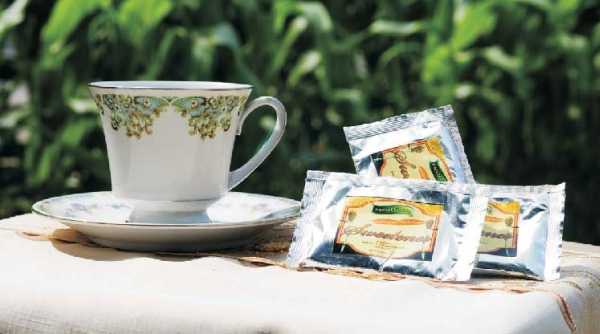A natural sweetener from sweet sorghum syrup will be hitting the market soon. And it comes in fine, milky-looking powder form.

When asked how different the sweet sorghum sweetener is from the commercially available sweetener in the market, Mr. Antonio S. Arcangel, general manager of the Bapamin Enterprise, had no qualms in proudly stating the facts. “It’s all natural and it has medium-low glycemic index compared to other sweetener which is good for diabetics.”
“In terms of physical attributes, sweet sorghum powder is fine in texture and slightly hygroscopic which means that it has good solubility even in cold water and has high flavor retention. Taste-wise, it is milky and has a distinctly sweet taste that does not leave any after taste in the tongue or add any unnecessary flavor to your beverage,” he said.
Mr. Arcangel developed the sweetener from sweet sorghum syrup through the project, “Value Added Technique in Sweet Syrup: Spray Drying and Packaging for Convenience Market,” which is funded by the Bureau of Agricultural Research (BAR) under its National Technology Commercialization Program (NTCP).
The goal of the project is to convert the sweet sorghum syrup into a high value food product such as the powder sweetener and packaged them into sachets for convenient handling and longer shelf life. “An important component of this project is the acquiring of a spray drying machine to do the main job: convert the syrup into powder in large volume,” Mr. Arcangel explained.
The spray drying machine
On 6 June 2013, together with a visiting group from BAR’s Technology Commercialization Division (TCD) and Applied Communications Division (ACD), Mr. Arcangel and his group conducted a dry-run to test the machine. According to Mr. Arcangel, the machine originally came from Germany and was eventually fabricated in the Philippines. “At about 15 feet tall, the spray dryer for sweet sorghum is only the fifth of its kind in the Philippines,” he added.
In a six hour operation, the machine can process and convert a 10-kilo of the sweet sorghum feedstock (syrup) into powder form. This will be packaged in sachet, each containing 10 grams. The 10 kilo powder sweetener will produce around 1,000 sachets. The suggested retail price will be at P3.50 per sachet which makes it competitive.
Comparing it to other natural sweeteners
Probably two of the great competitors of sweet sorghum sweetener in the market are Stevia and coco sugar. Both are packaged and sold as natural sweetners which are also anti-diabetic. But Mr. Arcangel has more to say about his product over the two top competitors.
“Plantation-wise, sweet sorghum is easy to grow and maintain. Since it is an introduced crop from India, sweet sorghum is drought-resistant and is suitable for planting even in non-irrigated, marginal areas. Also, collecting feedstocks (syrup) is much easier and larger in volume compared to Stevia plant wherein sweetener is mainly extracted from its leaves.
When it comes to coco sugar, sweet sorghum sweetener has a better advantage. It is cheaper to produce. Unlike coconut sap sugar production, which is done virtually by manual methods from harvest to cooking for sugar crystallization, the production of sweet sorghum sweetener is mechanized allowing for bulk volume. And with the spray-drying facility to back up the anticipated demand in volume, the prospect becomes more promising for the sweetener from sweet sorghum.
Packaging and marketing
Part of the component of the project is its taste improvement and testing. Packaging and labeling will be the last segment which is important in attracting customers and reaching the international market.
Bapamin will produce a sample volume soon. “We intend to release it in August during the BAR’s National Agriculture and Fisheries Technology Forum and Product Exhibition at SM Megamall,” announced Mr. Arcangel.
“This will be sold in specialty stores, more of a niche market that is into selling organic and natural products like Healthy Choices in Greenhills. Hopefully, after we launched the product, we will tap 10 outlets in Metro Manila as outlets. We want to cater to the anti-diabetics, travelers, food, coffee shops and others that need a fixed sweetener volume of single packs,” Mr. Arcangel explained.
Although not in the mainstream market yet, Bapamin has been an active participant in various agricultural trade fairs and exhibits wherein they have been showcasing the sweetener from sweet sorghum.
“Two years ago, we met someone in the Agrilink exhibit who has been using coco sugar. We urged him to try our sweetener and mix it with the sweet sorghum vinegar. We also asked him to have his condition regularly monitor by his doctor to know if it’s effective. Ever since, until today, he comes to our house to get his supplies. He is even willing to give his testimonies for our product. After two years of using the sweetener, he felt strong and he can now walk without a cane. ###
Source: Rita T. dela Cruz, Bar Chronicle June 2013 Issue (Vol. 14 No. 6)
I would like to speak with Mr. Antonio S. Arcangel to discuss sweet sorghum powder as a commercial food ingredient/sweetener. Please have him contact me at his earliest convenience. Thank you very much.